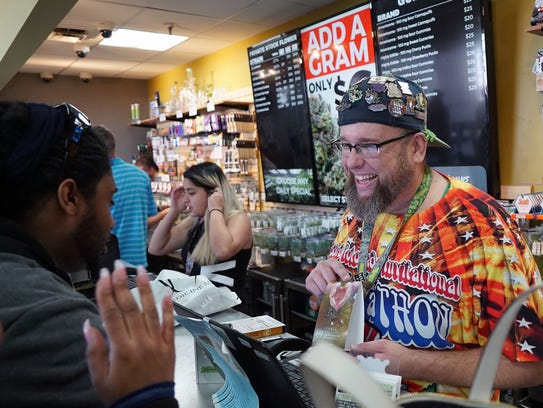“If you increase the prevalence of (marijuana) users, you are going to increase the prevalence of people who have adverse consequences."

What's the big deal with legal pot? No one knows yet
https://www.usatoday.com/story/news/nation/2017/07/31/marijuana-social-consequences/507384001/
How legalized marijuana is affecting our society has no clear answers, scientists and public health experts say — mainly because we don't have enough information yet.
In Colorado, state-sanctioned sales to any adult have been legal only since Jan. 1, 2014. Massachusetts, where voters approved a ballot initiative last year, won't see retail sales until July 2018.
Studies have shown both increases and decreases in youth and adult use, unreliable law-enforcement data about crashes and uncertainty about whether medical marijuana does what its backers claim.
While marijuana evangelists often deny that the drug could hurt anyone, some drug treatment experts say that when highly concentrated, it can cause psychosis.
Medical benefits
Marijuana appears to be an effective treatment for chronic pain, nausea and symptoms of multiple sclerosis, according to a January 2017 report from some of the nation’s top doctors and public health experts.
Commissioned by the National Academies of Sciences, Engineering and Medicine, the report said “conclusive or substantial” research backs the effectiveness of cannabis for those three conditions.
But the report also warns of dangers: Increased risk of car crashes, lower birth weights and problems with memory and attention. It found strong connections between heavy cannabis use and the development of schizophrenia and other psychoses.
A variety of state and federal government agencies helped pay for the report, which included research from medical doctors, mental health practitioners and addiction specialists. Authors repeatedly noted that data on marijuana use is limited and scientists need more information as more and more states legalize medical marijuana.
“If you increase the prevalence of (marijuana) users, you are going to increase the prevalence of people who have adverse consequences.”
Deborah Hasin, Columbia University"Conclusive evidence regarding the short- and long-term health effects (harms and benefits) of cannabis use remains elusive. A lack of scientific research has resulted in a lack of information on the health implications of cannabis use, which is a significant public health concern for vulnerable populations such as adolescents and pregnant women,” the report said.
Deborah Hasin, an epidemiology professor at Columbia University’s Mailman School of Public Health, has performed studies that found the prevalence of marijuana use disorders doubled between 2001 and 2013.
“If you increase the prevalence of users, you are going to increase the prevalence of people who have adverse consequences,” she said.

A "budtender" at Denver's Medicine Man marijuana store helps customers with their purchase. Experts say they're not sure how widespread access to high-quality marijuana may change American society. (Photo: Trevor Hughes, USA TODAY)
Youth use
But the data on which Hasin based her most recent study also showed slight drops in youth marijuana use in Colorado in the years following legalization. Voters legalized the drug in 2012, but sales didn't start until about 14 months later.
In Colorado, the percentage of teens 12 to 17 who had used marijuana in the previous month dropped from 12.6% in 2012-13 to 11.1% in 2014-15. In the same period, teens' past-year use dropped twice as fast, from 20.8% to 18.8%.
In Washington, which legalized recreational marijuana in 2012, 17% of high school sophomores surveyed in 2016 reported having used marijuana in the previous month, down from 20% in 2010, according to the annual Washington State Healthy Youth Survey.
Nationally, 7.2% of teens reported using marijuana the previous month in 2014-15, according to the National Survey on Drug Use and Health from that year. The survey is the most recent one available from the federal Substance Abuse and Mental Health Services Administration.

A cloud of marijuana smoke hangs over the annual 4/20 rally April 20, 2017, in Denver. Experts say they have no clear answers on how widespread marijuana legalization will affect our society. (Photo: Trevor Hughes, USA TODAY)
Crime and public safety
Colorado Attorney General Cynthia Coffman said she believes data collection is lagging everywhere in the marijuana industry.
As the top law enforcement officer for the first state to legalize pot, Coffman worries about small towns struggling with the effects of major growing operations and marijuana users moving to big cities without jobs or housing.
“Has the sky fallen? No it hasn’t, but there has been a cultural change," she said. "We’ve seen it in small towns and big cities. ...
"I would be pleased if it didn’t have a significant effect on crime, on DUI, on kids. It would make me happy to be wrong," she said. "I live in the world that sees the consequences.”
“I happen to think that the data hasn’t necessarily caught up with the issues that we’re seeing.”
Cynthia Coffman, Colorado attorney generalDale Mondary, a police chief in Desert Hot Springs, Calif. — a former Drug Abuse Resistance Education officer now policing California's first city to allow commercial marijuana growing operations — remains deeply concerned about what will happen when people drive high.
First, he fears they will cause crashes. And second, because marijuana intoxication has no standard like blood-alcohol content for booze, he fears that his officers will be spending more and more time in courtrooms.
National Highway Traffic Safety Administration officials have said they believe drugs are increasingly a factor in fatal crashes though more research is needed. In 2015, about 1 in 5 of more than 31,000 fatal crashes in the U.S. involved at least one driver who tested positive for drugs — up from 12% in 2005.
A separate federal study of 11,000 weekend, nighttime drivers found 15.1% tested positive for illegal drugs in 2013 and 2014, up from 12.4% in 2007. Marijuana represented the largest increase: 12.6% tested positive in 2013 and 2014, up from 8.6% in 2007.
Mondary also is worried about security at dispensaries and the persistence of the black market.
"I’m still very, very concerned about the recreational use. And frankly I’m opposed to the recreational use," he said.
But part of his job now is to protect the industry and its customers.
"If the city is going to allow it, I need to make sure we keep that product and our community just as absolutely safe as we can get it," he said.
Learning from other states
Mason Tvert, a spokesman for the pro-legalization Marijuana Policy Project who helped pass the Colorado law, believes concerns about marijuana are overblown and said the vast majority of users consume it responsibly.
The increasing acceptance of marijuana legalization reflects the reality that marijuana is far safer than many other widely accepted drugs, from prescription opiates like OxyContin to alcohol, he said.
“There’s more use overall because people are recognizing that marijuana use is not as harmful as they were led to believe,” Tvert said. Many police officers have struggled to accept that voters have chosen to legalize marijuana, and many skeptics' claims have proven false.
And the war on drugs has brought innumerable negative consequences across the country, particularly for minority communities, he said.
“There’s more use overall because people are recognizing that marijuana use is not as harmful as they were led to believe.”
Mason Tvert, Marijuana Policy ProjectState lawmakers are watching early adopters Colorado, Oregon and Washington, John Hudak of the Brookings Institution said. Some states have sought to preempt disconcerting trends, especially involving kids.
In the months after legalization, Colorado saw a jump in the number of children hospitalized for marijuana poisoning. The state later put new packaging and labeling regulations in place.
Now states such as Massachusetts, where lawmakers are crafting their own recreational pot rules, are writing those kinds of regulations into the laws before the first marijuana products get sold.
The debate is no longer about whether marijuana legalization will expand but what steps state legislators take to manage the risks that can accompany the industry, Hudak said.
"The march toward reform is an obvious one,” he said.



Like many other things, making pot readily available and legally sanctioned by the government has it's good points and bad points.
Because people are making a lot of money and governments are collecting taxes on it, we don't hear much about the bad points.
If you increase the prevalence of (marijuana) users, you are going to increase the prevalence of people who have adverse consequences.
Well, let's reverse engineer this maxim. If you reduce the prevalence of alcohol users, you are going to decrease the prevalence of people who have adverse consequences. Same goes for fast food and obesity, cigarettes and cancer, sky diving and defective parachutes, and a host of other legal potentially dangerous things. Ban them all, or quit zeroing in on marijuana.
There has always been a presumption spread by pot advocates that marijuana is good for you. That is misleading at best. Yes it has some benefits to some, but it also has some deleterious effects.
I am unfamiliar with anyone touting marijuana being good for you. Nobody drinks alcohol because it's good for them.
Marijuana is just a plant. It can be grown anywhere and needs no special care or processing. It would be impossible to effectively stop it from being grown and used. Trying to do so is just hurting the country, and lining the pockets of unscrupulous agencies and special interests.
I don't think that's what he's referring to.
It was banned for racist reasons and never should have been. It's far safer than alcohol and the individuals should have the choice of what they put in their bodies. What we see here is tyranny. It's oppressive and cruel for those that choose it as medicine.
I think it's pretty unlikely that a large number of pot smokers abstained on the grounds that it was illegal.
yeah I have know only two people that the illegality factor stopped them..
I've known hundreds it didn't.
I've also know many people who have died in alcohol related deaths but none from marijuana.
"Like most psychological experiences, there is a spectrum of paranoia within the population: many people have a few, relatively mild paranoid thoughts, while for a few people those thoughts are numerous, persistent, and profoundly unsettling. Cannabis users are more likely to be at the problematic end of that spectrum. For instance, our study of the population of England found that the belief that people are deliberately trying to harm you is three times as common among cannabis users as it is among non-users. The belief that people are trying to cause you serious injury or harm is five times as common among cannabis users.
However, what we see here is an association between cannabis and paranoia. Experts generally agree that regular use of cannabis starting from an early age is an accurate predictor of later severe mental health problems, but what hasn’t been established is whether the drug causes paranoid thoughts. Maybe people suffering from paranoia are more likely to start taking cannabis; or perhaps the drug use and the suspicious thoughts are independent consequences of another factor entirely.
This question of the tangled interrelationship of paranoia and cannabis use was at the heart of a study we conducted with colleagues from the University of Oxford, the Institute of Psychiatry at King's College London, and the University of Manchester, published on Wednesday in Schizophrenia Bulletin . Why did we focus on paranoia rather than mental health in general? Other studies tend to lump all such problems together under the heading of “psychosis” or “schizophrenia”, but as we’ve argued previously on this blog such experiences frequently occur independently: having paranoid thoughts doesn’t mean, for example, that someone will also hear imaginary voices.
To discover whether cannabis really does cause paranoia in vulnerable individuals, we carried out the largest ever study of the effects of THC (∆ 9 -tetrahydrocannabinol, the drug’s principal psychoactive ingredient). We recruited 121 volunteers, all of whom had taken cannabis at least once before, and all of whom reported having experienced paranoid thoughts in the previous month (which is typical of half the population). None had been diagnosed with a mental illness. The volunteers were randomly chosen to receive an intravenous 1.5mg dose of either THC (the equivalent of a strong joint) or a placebo (saline). To track the effects of these substances, we used the most extensive form of assessment yet deployed to test paranoia, including a virtual-reality scenario, a real-life social situation, self-administered questionnaires, and expert interviewer assessments.
The results were clear: THC caused paranoid thoughts. Half of those given THC experienced paranoia, compared with 30% of the placebo group: that is, one in five had an increase in paranoia that was directly attributable to the THC. (Interestingly, the placebo produced extraordinary effects in certain individuals. They were convinced they were stoned, and acted accordingly. Because at the time we didn’t know who had been given the drug, we assumed they were high too.)"
For instance, our study of the population of England found that the belief that people are deliberately trying to harm you is three times as common among cannabis users as it is among non-users.
Maybe that has something to do with the fact that there is someone trying to harm them - law enforcement. Decriminalize it and maybe people would be less paranoid.
If you want to see how untrue the paranoia thing is, take a walk down the boardwalk at Venice Beach, CA. People are walking around all over the place toking up, with cops sitting around in the shade paying no attention whatsoever. Users aren't hurting anyone, they're just enjoying themselves while shopping and getting some sun. Go to a Slightly Stoopid, Ben Harper, Sublime, Willie Nelson, etc. concert, and witness more post smoking in one place than you've ever seen, whether it's in a legal state or not. Nobody is having a nervous breakdown. There might be a few jackasses who drank too much, but weed is never an issue.
I don't know Hal I think it's hard to beat CU on 4/20 for most pot smoking in one place.
what we see here is an association between cannabis and paranoia.
So what, if all the alcoholics in this country could be arrested and lose their freedom for taking one damn little a drink, I'll bet they'ed be a little more paranoid as well.
Take away that FEAR factor and restudy it !! Therefore, I consider this study/story a load of crap !!!
Sure if it's illegal sure it's scary it do.... Duuuuu !
No one I've ever known WANT's to go to jail ! But I have known quiet a few folks who sure have enjoyed smoking a little pot anyway.
/www.theguardian.com
LOL !
Conclusive evidence regarding the short- and long-term health effects (harms and benefits) of cannabis use remains elusive.
And why is it elusive, because our wonderful guvment in its benign big brotherliness, made it illegal to study it.